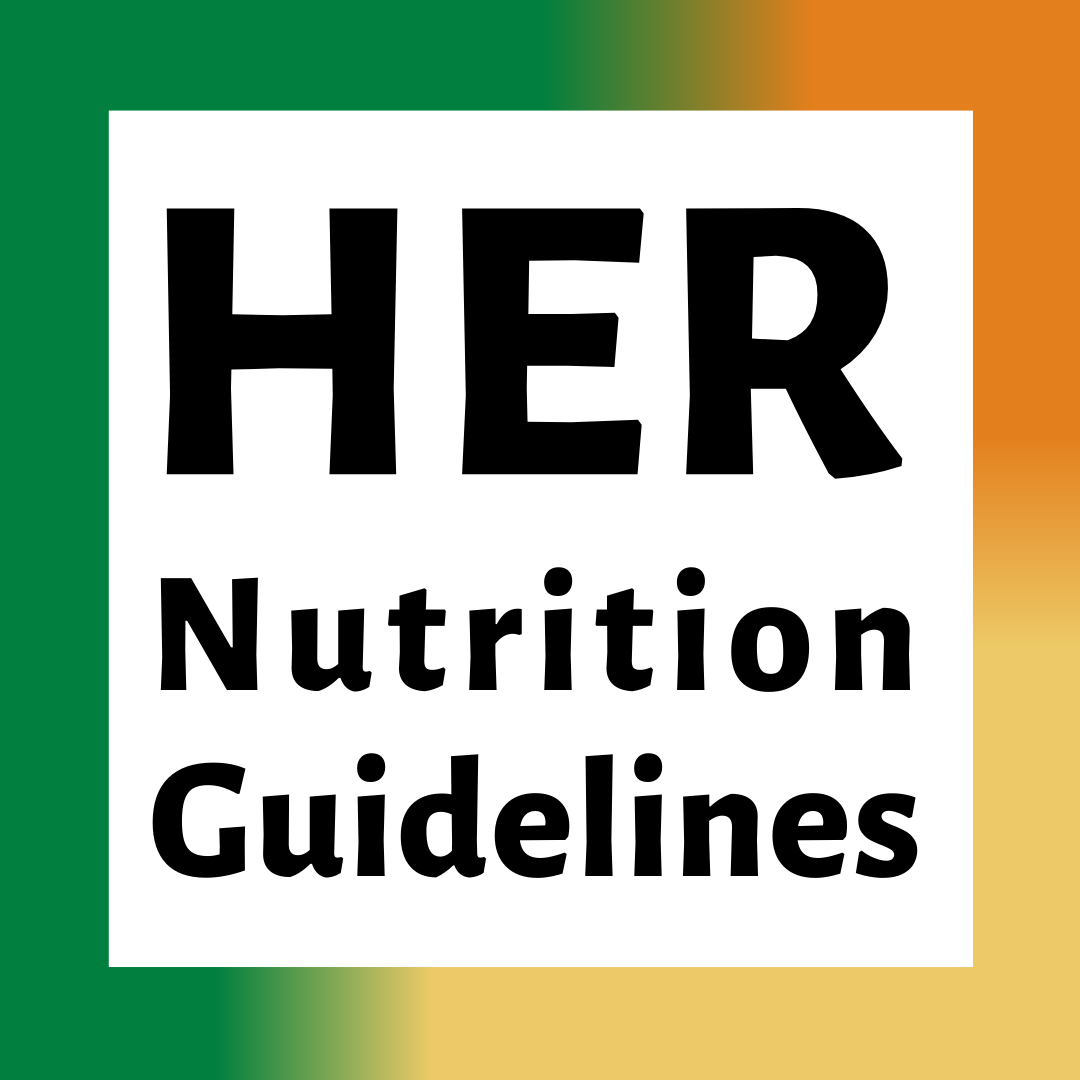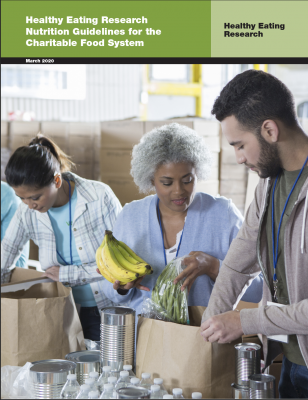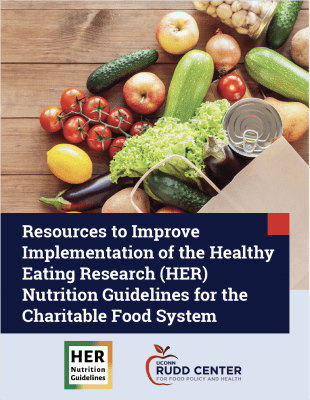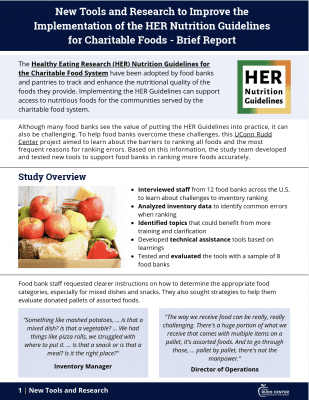
HER Nutrition Guidelines - Tools for Researchers
If you work at a food pantry or food bank, please visit our "Tools for the Charitable Food System" page.
This page serves as a "one-stop shop" for tools that can be used when researching the charitable food system.
The Healthy Eating Research Nutrition Guidelines provide an evidence-based framework for evaluating and improving the nutritional quality of food within the charitable food system. Developed in 2019 by a panel of nutrition, food policy, and food security experts, the guidelines establish cut-offs for saturated fat, sodium, and added sugar across eleven food categories. These standards are then used to classify items as either "Choose Often," "Choose Sometimes," or "Choose Rarely" to help neighbors make informed choices.
For researchers, the HER Guidelines are a practical tool to study nutrition in the charitable food system. They can be used to track the quality of foods being offered, compare results across sites, or measure changes over time. Additionally, resources like the WellSCAN app and step-by-step ranking guidance make it easier to apply the guidelines consistently. Whether your focus is equity, policy, or on-the-ground operations, these materials are designed to help you collect the data you need and generate insights that can inform both research and practice!
On this page, which is specifically designed for researchers, you will find:
- Key research studies that have utilized the HER Nutrition Guidelines
- Resources that explain the Guidelines
- Information about ranking and logging foods using the WellSCAN suite of tools
Resources
Understanding the Guidelines
Products are divided into 11 categories; and within categories, items are ranked into tiers of “choose often” (green columns), “choose sometimes” (yellow columns), and “choose rarely” (red columns) based on saturated fat, sodium, and added sugar nutrient thresholds. Product examples are provided for each of the 11 food categories to illustrate the types of items that would fall into each category. Additional details can be found in the full report.
The 11 categories of food are: Fruits and Vegetables, Grains, Protein, Dairy, Non-Dairy Alternatives, Beverages, Mixed Dishes, Processed and Packaged Snacks, Desserts, Condiments and Cooking Staples, and Miscellaneous Products.
The expert panel chose to focus primarily on these three nutrients to limit – saturated fat, sodium, and added sugar – based on evidence linking increased consumption to increased risk for diet-related chronic diseases, including obesity, diabetes, hypertension, and cardiovascular disease. The current thresholds for each are based on nutrients found in a single serving of food. Anchoring the guidelines to serving size allows straightforward identification of necessary information on the Nutrition Facts Label, and should make the system easier to implement.
One-Page Summary of Guidelines
Additionally, More than Food Consulting (in partnership with Feeding America), created two handouts to help partners understand and implement the HER Guidelines:
WellSCAN
WellSCAN is an ever-evolving suite of digital tools and products made to help food banks and food pantries better identify, rank, and log the nutritional quality of their inventory. Additionally, WellSCAN can be utilized by researchers looking to track the nutritional quality of foods offered by partners in the charitable food system.
WellSCAN's ranking technology can be accessed via the WellSCAN website on your computer or mobile device. Specific tools on the website include:
- Calculator: Input an item's food category and nutrition information to determine its HER rank
- Search: Lookup specific foods by name or UPC to find their HER rank
- Inventory Collection: Log the HER ranks of all items at a pantry/food bank
Acknowledgements: The Rudd Center created the WellSCAN suite of technology in partnership with the University of Connecticut Digital Experience Group. This project has been made possible with support from Partnership for a Healthier America, Feeding America, The Claneil Foundation, and the Robert Wood Johnson Foundation.
Contact: Questions about the WellSCAN suite can be directed to Marlene Schwartz (marlene.schwartz@uconn.edu)
Key Research Studies
Validating a Nutrition Ranking System for Food Pantries Using the Healthy Eating Index-2015
- Authors: Maria Gombi-Vaca, Ran Xu, Marlene Schwartz, and Caitlin Caspi
- September 2022
- Two-Page Brief
Construct validity of the Charitable Food Nutrition Index
- Authors: Maria Gombi-Vaca, Ran Xu, Marlene Schwartz, and Caitlin Caspi
- November 2023
Nutrition standards for the charitable food system: challenges and opportunities
- Authors: Ronli Levi, Marlene Schwartz, Katie Martin, and Hilary Seligman
- March 2022
- Authors: Maria Gombi-Vaca and Marlene Schwartz
- February 2023
- One-Page Report of the Findings
Resources to Improve Implementation
This guide contains training materials, resources, tips, and examples of practices to help food banks improve the implementation of Healthy Eating Research (HER) Nutrition Guidelines for the Charitable Food System. To create this guide, we interviewed people working in food banks across the country to learn how they approach ranking foods using the HER Guidelines. They shared their experiences, the challenges they face, and the practices that help with their work. We also analyzed these food banks’ inventory reports to identify specific categories of foods that are most confusing to rank and topics that needed clarification or more training. This resource was created as part of a research project supported by Healthy Eating Research, with funding from the Robert Wood Johnson Foundation (Award 81351).
Authors: Maria Gombi Vaca, Violeta Chacón, Isabelli Costa da Silva, Marlene Schwartz, Caitlin Caspi, Katie Martin, and Maisie Campbell
Additionally, if you are looking for specific training materials, we have divided the guide into 6 separate resources:
- HER Guidelines Basic Training
- Step-by-Step Guide to Ranking Foods
- Foods Always Ranked the Same
- Ranking Foods from USDA
- Common Challenges When Ranking
- Checking for Ranking Errors in Inventory Reports
Finally, we have created a two-page brief summarizing the results of this project, the contents of the guide, and the impact of the technical assistance that was provided to food banks:



